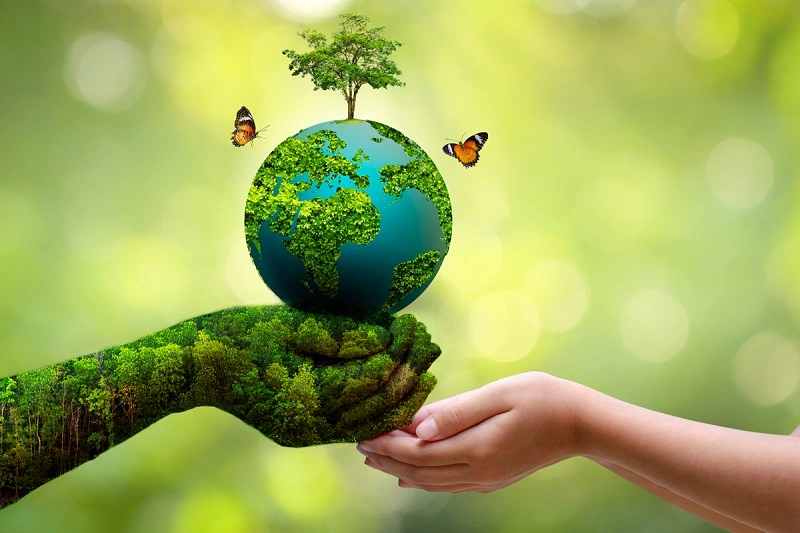As we celebrate World Environment Day, the theme of this year is clear: “Our Land. Our Future. We are #GenerationRestoration.” Generation restoration is not just a global or communal effort; it is incredibly personal.
The actions we take today to restore and protect our environment are inherently tied to our values, responsibilities, and the legacy we wish to leave behind. For me, as an environmental scientist working across the globe but originally from
Assam—a state with rich biodiversity and natural resources—the cause of restoration is deeply rooted in personal experiences and scientific pursuits.
A Legacy of Environmental Stewardship
Growing up in Assam, I was surrounded by a rich natural environment, including thriving forests, winding rivers, and a diverse array of wildlife. From a young age, my parents and grandparents instilled in me a deep respect for the natural world. Our discussions often revolved around the importance of protecting and conserving the environment.
Their unwavering dedication to these causes served as a great source of inspiration for me. This early exposure to environmental challenges and their possible solutions profoundly influenced my decision to focus on environmental sciences during my higher education.
Like me, there are millions of others whose personal journeys into environmental activism are significant, emphasizing the importance of environmental restoration.
Personal Well-being and Environmental Health
The intricate connection between personal well-being and environmental health is of utmost asignificance. It is crucial to recognize that environmental degradation, such as air, land, and water pollution, has a direct and far-reaching impact on our health and overall wellness.
The availability of clean air, safe drinking water, and nutritious food is fundamental for sustaining a healthy lifestyle. Engaging in restoration initiatives not only serves to protect our health but also contributes to the well-being of our families and communities at large.
For instance, the deliberate and strategic planting of trees in urban areas has been scientifically proven to significantly enhance air quality, thereby reducing the prevalence of respiratory diseases and promoting improved overall health.
In this case, landscape architecture plays an integral role in the delicate fabric of modern-day urban city planning, influencing the quality of life of its inhabitants.
Economic Security and Cultural Heritage
Many livelihoods, particularly in rural and agricultural communities, depend directly on the health of local ecosystems. Sustainable practices ensure that these resources remain available for future generations.
In Assam, traditional agricultural practices amongst indigenous tribes have long emphasized sustainability and ecological balance. These methods passed down through generations, not only preserve the environment but also secure the economic stability of local communities.
For many, including myself, the natural world is intertwined with cultural heritage and spiritual beliefs. Restoring ecosystems can be an act of preserving cultural identity and spiritual practice.
In Assam, the sacred groves and river systems are environmental treasures and cultural and spiritual sanctuaries. The traditions and wisdom of our ancestors in maintaining these spaces can deeply influence our professional and personal ethos.
Personal Fulfillment and Mental Health
Participating in the meaningful act of restoration activities can be immensely fulfilling and therapeutic. Engaging in tasks such as carefully planting trees, meticulously cleaning river banks, and thoughtfully restoring wetlands provides a sincere sense of achievement.
It fosters a deep and meaningful connection with the natural world. Research has consistently demonstrated that immersing oneself in nature has the remarkable ability to alleviate stress, reduce anxiety, and combat depression, ultimately enhancing overall mental well-being.
These findings strongly resonate with my cherished childhood experiences in Assam, where actively participating in community clean-up drives and tree-planting events brought immense joy and inspired me to develop an impact-driven sense of purpose.
Empowerment and Community Building
Participation in restoration projects serves to empower individuals by enabling them to effect tangible change, fostering a sense of agency and purpose.
Moreover, these endeavors frequently unite communities, engendering a collective sense of purpose and fortifying social bonds. Engaging in collaborative restoration projects can cultivate a sense of community and shared responsibility.
In Northeast India, community-led initiatives with global outreach are the need of the hour, such as those in Kaziranga National Park and Majuli Island, which exemplify the potency of collective action in environmental restoration.
Educational Foundations
Restoration projects provide valuable educational experiences for people of all ages. Teaching children about the significance of ecosystems and how to take care of the environment instills values that can last a lifetime.
These educational experiences can inspire a lifelong commitment to environmental stewardship. My own journey in environmental sciences was significantly shaped by the knowledge and values imparted by my family and community in Assam, along with international exposure through internships, projects, and higher education in the field.
Personal Actions for Generation Restoration
- Conservation at Home: Simple actions such as reducing waste, conserving water, and using energy-efficient appliances contribute to environmental restoration.
- Volunteering: Participating in local clean-up events, tree-planting drives, and habitat restoration projects can have a significant impact.
- Advocacy and Education: Raising awareness about environmental issues and advocating for sustainable policies at local and national levels is crucial. Educating oneself and others can drive broader societal change. As a scientist and educator, I strive to incorporate these principles into my teaching and research.
- Sustainable Lifestyle Choices: Choosing sustainable products, supporting eco-friendly businesses, and reducing one’s carbon footprint are personal choices that collectively make a big difference.
Generation restoration is a deeply personal journey that intertwines our daily lives with the broader goals of environmental sustainability.
By recognizing our personal stake in the health of the planet, we can drive meaningful change that honors our ancestors and protects the future of our descendants.
Through individual actions and community efforts, we contribute to a legacy of resilience and hope, ensuring that the planet thrives for the next generations.
Dr. Jagannath Biswakarma works at the School of Earth Sciences in University of Bristol, United Kingdom.
Email: jagannath.biswakarma@bristol.ac.uk















